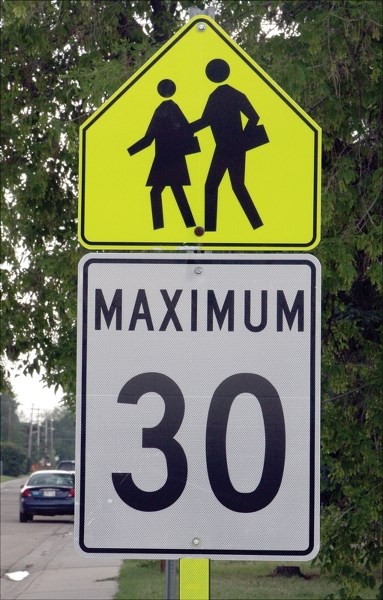When the Town of Westlock held its public open house is regards to its proposed new traffic bylaw, councillors were split.
The majority of those who attended the June 22 open house in council chambers were in support of the change, while those opposed to it also had their voices heard. However, over the course of the hour-long session, it was Alberta Transportation regional traffic safety consultant David Mckenzie whose impact was felt the most.
The proposed bylaw would see residential speed limits reduced to 40 km/h from 50 km/h and school zones turned into playground zones. Mckenzie presented council with information about the differences in stopping distances and survival rates between collisions at 50 km/h versus 40 km/h.
Deputy mayor David Truckey agreed it was Mckenzie’s presentation that was the pivotal moment.
“I think his impact was very high,” he said. “It was an even split, very passionate comments on both sides, but once Mr. Mckenzie spoke I think he was the turning point for what council felt was going to be the best for the community.”
Mckenzie said in his experience speed-limit reductions are positive for communities.
“In the communities I’ve worked in I’ve always thought that 50 km/h is a bit quick for a residential area,” Mckenzie said.
“The movement of traffic in residential areas is a little more unpredictable than say on a main road. The residences and the amount of driveways, parked cars on the side, and youth using the streets as a hockey rink … it can be unpredictable.”
According to statistics presented by Mckenzie speed is the difference between life and death for pedestrians. A pedestrian hit by a vehicle travelling at 30 km/h has a 95 per cent survival rate, compared to 45 per cent at 50 km/h.
“Obviously the reduced speed just makes it a safer environment for all the users of the roadways and sidewalks,” he said.
In his time with Alberta Transportation Mckenzie said he has seen a number of communities go ahead with the speed reduction, and for the most part, the change is well received.
“The ones that have changed their speed limits in residential areas seem to be quite pleased, the communities seem to accept it quite well and adhere to the speed limit,” he said. “I think everybody understands that it’s all about safety and it doesn’t take long for people to get on board with it.”
A 26-year-veteran of the RCMP Mckenzie has seen enough speed-related incidents he can vouch for its effectiveness. As far as what it was about his talk that resonated with council, Mckenzie figures the safety aspect hits home.
“It’s a dramatic drop in injury and fatality rates when you drop from 50 km/h to 40 km/h and I think everybody can subscribe to that,” he said. “You don’t have to wait for a horrendous fatality or a real public outcry. These things can be quite proactive and nobody wants to see or deal with a tragedy that might occur.”
Council has passed first reading of the bylaw, however consideration of second and third readings was tabled to council’s July 13 meeting.



